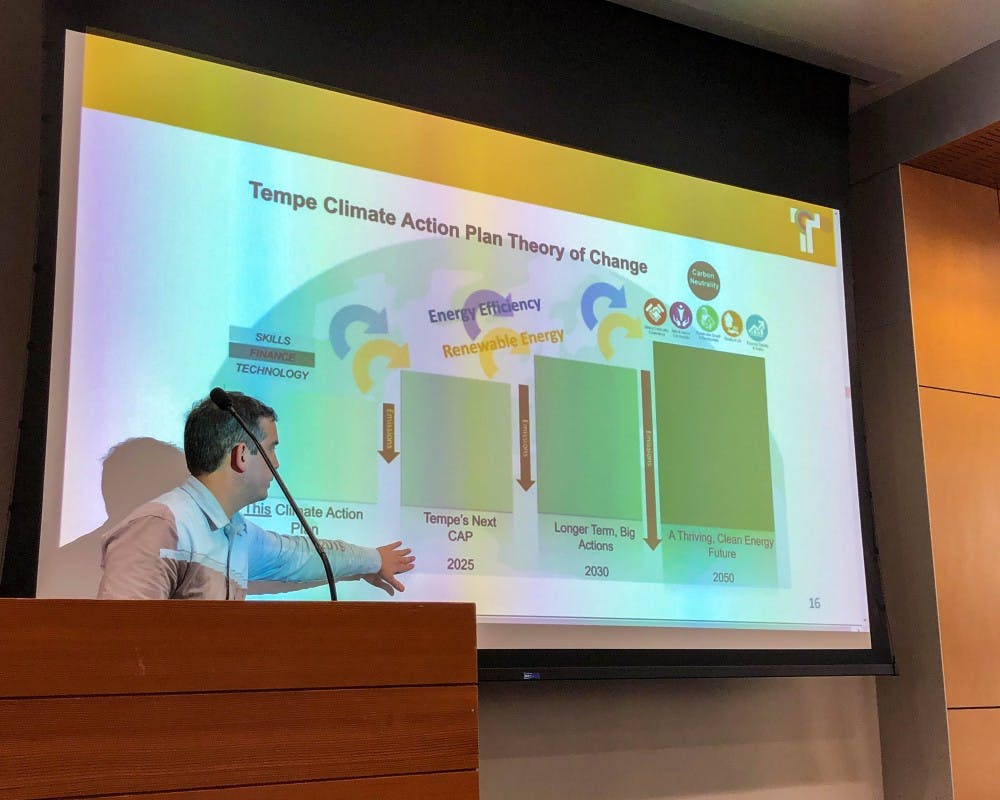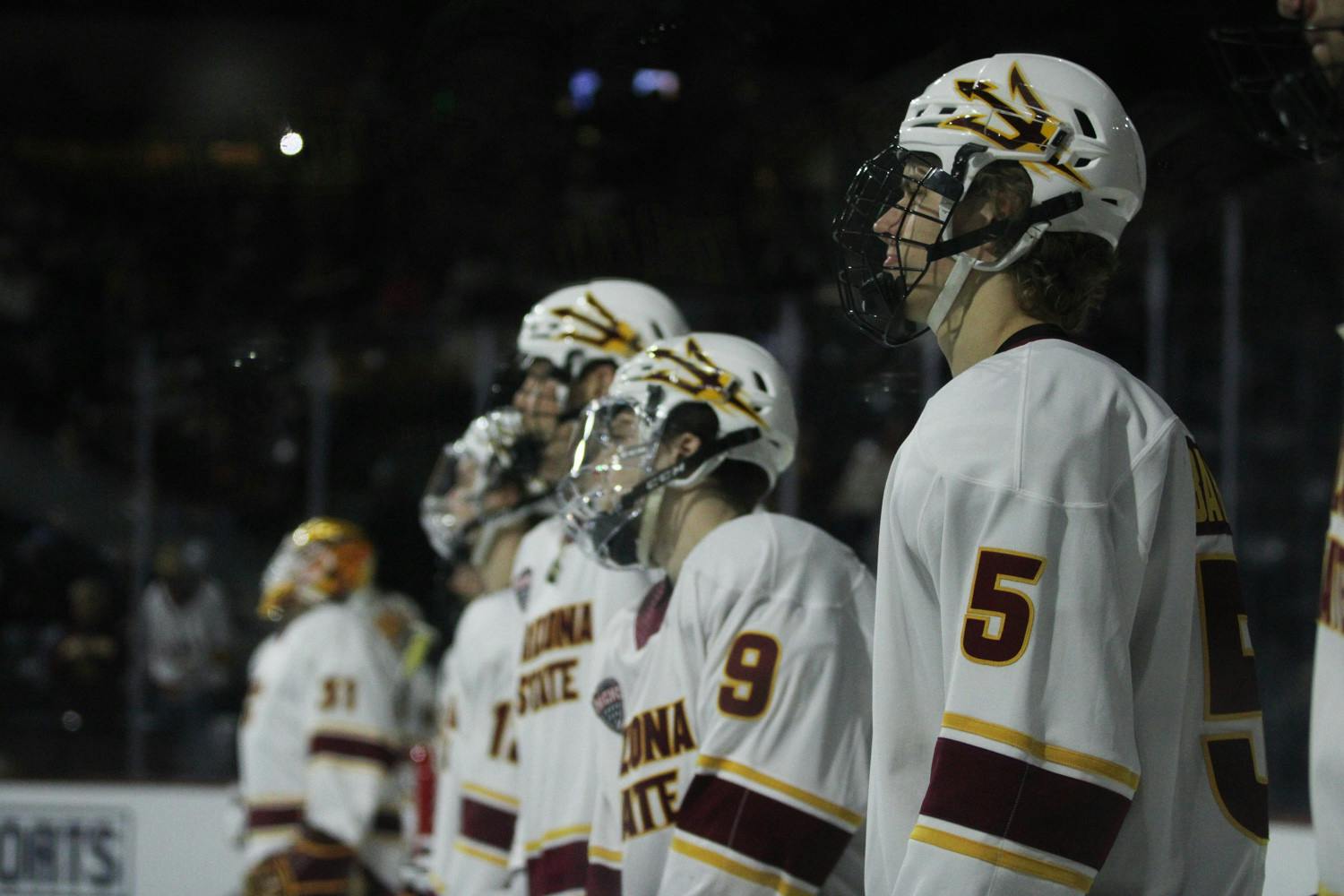While climate change is becoming more prominent on the global stage, Tempe commissioners and local stakeholders are building a strategy to address the nuanced effects of climate change residents face here in the city.
The City of Tempe is working with ASU to layout the city’s first climate action plan called CRAFT 2050: Climate Resilience and Action for Tempe, which outlines objectives to help mitigate climate-related issues in the city.
The 12-part climate action plan is still in its early stages, but has gone through several public reviews and is undergoing revisions. The City of Tempe, School for the Future of Innovation in Society and the Global Consortium for Sustainability Outcomes are among the main entities spearheading the plan.
Currently, the plan is slated to be submitted to the city council next fall.
"This is our very first climate action plan in 2019," said Braden Kay, director of sustainability for the City of Tempe said at Tempe Climate Action Plan Forum at ASU on April 9. "This is the training wheels version and hopefully, hopefully, in a few years, we'll then attack a more comprehensive version of a climate action plan."
On Monday, members of the Tempe Sustainability Commission convened to discuss the details of the climate action plan, focusing in on four of the concepts, including hiring an emergency manager who works on Tempe’s resilience to extreme heat and creating an urban forestry master plan that will increase the city’s tree canopy by planting and managing trees in city parks, streets and urban hubs.
The other two goals that were discussed were for the city to adopt green building code that aims to increase shade and use cool materials and building more green infrastructure, like that which reduces the usage of potable water and increases the use of stormwater.
The process for crafting the plan began two and a half years ago when the Julie Ann Wrigley Institute of Sustainability and the School for the Future of Innovation in Society started working on the climate action plan with the guidance of Vice Mayor Lauren Kuby, Kay said at last week's forum. Around the same time, the group also helped Tempe join the Global Covenant of Mayors for Climate & Energy.
Kay said that one of the essential parts in that process was working with the city to develop strategies that it could feasibly adopt and would lead to meaningful change.
“It is so important that your climate work and your sustainability work is attached to what the city is already doing and isn’t just a plan that sits on the shelf,” Kay said at the forum. “The way that Tempe makes decisions is it has a strategic management process … and so what our climate action plan is adding is two new goals to that strategic management process, one for carbon reduction and one for resilience to extreme heat.”
Lauren Withycombe Keeler, assistant research professor at the School of Future of Innovation in Society and who spoke at the forum, said that she has been working with Kay for 11 years with the city of Phoenix to update their general plan and that they both hope this climate action plan will open the door for Tempe to make more ambitious climate plans in the years to come.
ASU students have been a fundamental factor in the development of ideas for forums about transportation and energy in workshops and master’s projects, which is why student feedback on the climate action plan is so important to her, Keeler said.
“You are part of the Tempe community,” Keeler told students at the forum. “Yes, you are in the public, but you’re also students and staff and faculty at the University who have the capacity to make a difference with these efforts.”
Along with some ASU students having been a part of the process of bringing the plan to fruition, the group is looking to get more student feedback through events like the forum.
Students and other guests at the forum left red and green colored sticky notes on large poster boards outlining some of the objectives and ideas for Tempe’s plan. If students liked an idea, they could write a note on a green paper and post it. Red meant that they disagreed with the idea or thought it should be modified.
ASU alumnus and GreenLight Solutions Foundation co-founder Ryan Mores and associate professor in the School of Sustainability Arnim Wiek, who are both on the city's Sustainability Commission, shared their strategy with commissioners at Monday's meeting on how to increase community engagement of the climate action plan in the coming months.
The two described their strategy of increasing public education on green buildings and green infrastructure so that more constituents begin to urge their city council to adopt sustainable ordinances.
“What we’re trying to achieve is that young residents attend monthly public city council meetings,” Wiek said at the meeting. “We need to draft communication with them and find the right communication channels, reach out to them, follow up with them and so on.”
Mores said that younger people respond to different media than people of older generations and finding an effective way to share information with them is important to their agenda.
“Younger people are going to be more inclined to things on social media and short snippet videos, whereas other folks may want a handheld thing that they can physically read,” Mores said.
Still, the plans for outreach are in very early stages.
In an interview after the meeting, Mores said that climate change affects everyone in the community, so he hopes people of all political backgrounds come together to support the commission's sustainability initiatives and to understand how climate change affects them directly in their day-to-day lives.
“I think a lot of people are concerned about the melting ice caps and people talk about the polar bears and plastic straws,” Mores said. “Those are the poster children for climate change. In Tempe we’re talking about, ‘How can I go walk to lunch with my friend and not be worried about having heatstroke?’"
Reach the reporter at tmlane3@asu.edu and follow @tmflane on Twitter.
Like The State Press on Facebook and follow @statepress on Twitter.





